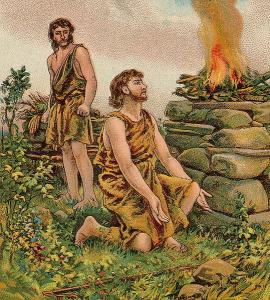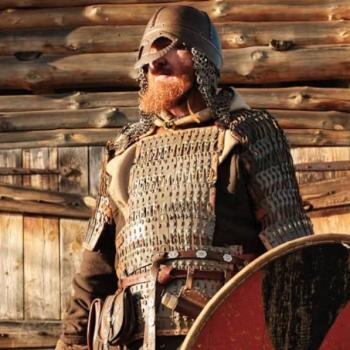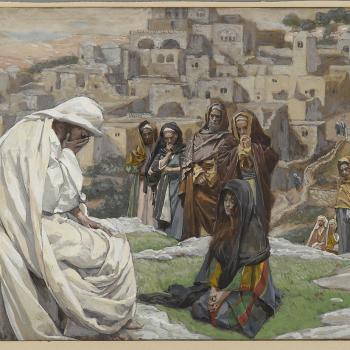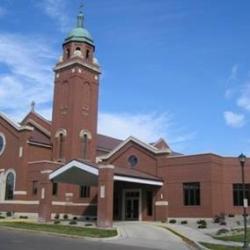The story of Cain and Abel (Genesis 4:1-16) tells us sin didn’t depart from the human race after the Original Sin. All of us are sinners, and in this post I suggest we look at Abel’s sin. After all, as parents we know that, when children fight, there’s never only one person at fault.
Episode 3 of the Rowing with Michael Series: A journey through the Jewish/Christian Scriptures in Verse and Commentary. Introduction and Contents for this series HERE.
Michael, row the boat ashore. Alleluia….
God looked down on his servant Abel. Alleluia.
Said, “I like what you put there on that table. Alleluia.
“You better not brag to your brother, Cain. Alleluia.
“If you want to live to make an offering again.” Alleluia.
What nice thing does God do for the murderer, Cain?
I don’t know how people imagine that the Bible supports capital punishment when we have this story in the Bible’s first book. God doesn’t take proportionate revenge on Cain, i.e., kill him. He does send Cain into exile, but he does something else. When Cain protests that everywhere he goes people will try to kill him, God puts a mark on him so people will know they’ll be in real trouble if they do anything to him. (It’s a little puzzling where all these people that Cain is afraid of are supposed to have come from. But it’s a story.)
I think good people let themselves off way too easily when they read this story. We tend to imagine that it’s evil versus good, the bad guy Cain against the good guy Abel. We tell the same story all the time—good cop against bad robbers, good detective against bad cops, good country against evil empire, good political party…. Sin isn’t like that, and it ought to have been obvious from the first “sin” story in the Bible. St. Paul had it exactly right when he said in one man, Adam, all sinned. That means Abel is a sinner, too.
Of course, we know we’re sinners. We might even admit that we have feelings of envy, like Cain. But we’re pretty sure we wouldn’t go so far as to kill a person out of envy. So we manage to hide from ourselves our complicity in much of the evil around us. I think this story could use another look.

Holier-than-thou Abel
Cain obviously is mad at Abel. Why isn’t he mad at God instead for not accepting his gift? Abel didn’t do anything at all to Cain. Or did he? I’m imagining some sibling rivalry between the two brothers. I can imagine Abel, just like a brother or sister, trying to be helpful and saying, “Well, if you’d offer God the best products of your labors, like me, God would accept them.” Or even: “My gift is better than your gift. Nah nah nah nah nah!”
How often have we given advice when comfort was needed? How often have we thought that we could encourage someone by comparing him or her with someone else? The first sin is trying to be like God and eating from the tree of “knowledge of good and bad.” The second sin—Abel’s sin—is attempting to use that knowledge, setting oneself up as the decider of good and bad, taking on an air of superiority, assuming for oneself a right to make judgments on others, to make comparisons.
Conceivably, it could have been different—but hardly. That’s the burden, the Original Sin, that weighs us down almost from the moment we begin to become aware of who we are. Jesus was surely aware of himself as a human being, but his awareness of God overwhelmed his whole being and saved him from the sin of pride. When someone addressed him as “Good Master,” he retorted, “Why do you call me good? No one is good but God alone.”
My grade school “Bible History” book (that was in the 50’s) said Cain’s sin was refusing to give God the best of his crop, but the story doesn’t say that. What does God expect of Cain? Not that he should be like Abel or as good as or better than Abel but only, in God’s own words in the story:
If you do well, you can hold up your head.
Image credit: Wikimedia Commons











